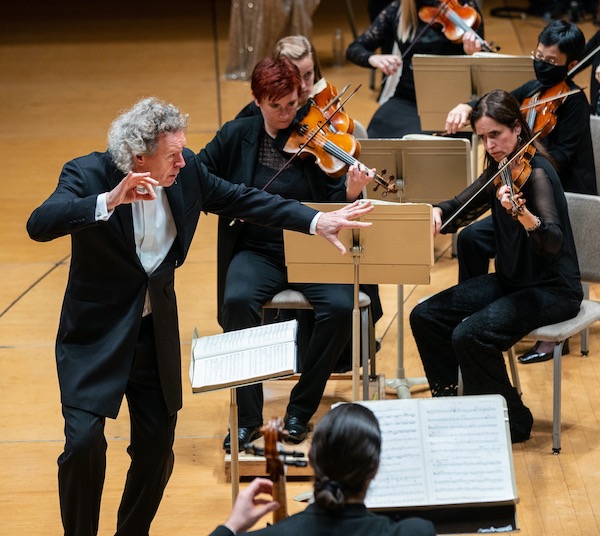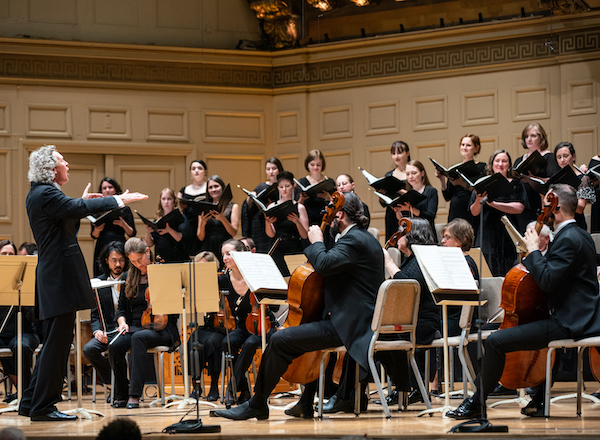Handel and Haydn Society marks the season with a triumphant “Messiah” and $10 million gift

Harry Christophers conducted the Handel and Haydn Society in Handel’s Messiah Friday night at Symphony Hall. Photo: Robert Torres
After a difficult year and a half, the Handel and Haydn Society has even more to be thankful for this holiday season than the return to live music-making.
Prior to Friday night’s performance of Handel’s Messiah at Symphony Hall, H&H board chair Robert Shapiro announced a gift of ten million dollars in honor of Harry Christophers’s achievements as artistic director. This largest single donation in the company’s history will establish the Harry Christophers Fund for Artistic Excellence, which will support conductor and soloist fees, orchestra and chorus compensation, audio and visual recoding and distribution, as well as touring. The anonymous donor said in a statement that “I wish to ensure that the next artistic director propels the magic, joy, and learning Harry Christophers created to new levels.”
The board also named Christophers Conductor Laureate of H&H. The conductor will assume his title when his tenure ends in May, which will hopefully ensure regular returns to the podium in Boston.
Christophers has indeed become as much a fixture in Boston as performances of Handel’s Messiah. For the past thirteen years, he has led more than thirty performances of the beloved score with the Handel and Haydn Society. Each has managed to make the popular oratorio—a seasonal Boston tradition for 168 years—sound fresh and new.
Christophers has always seen the work as a dramatic struggle between darkness and light. Yet his performances continue to reveal fresh nuances of Handel’s writing. With swift gestures or a sudden lunge, the conductor can shape a choral phrase or draw a blazing forte that carries the energy forward.
Such elements made H&H’s performance of Messiah Friday night a triumphant but bittersweet occasion, in Christophers’ final Messiah as artistic director. Sung with both poignance and vitality, this reading opened the holiday season on a profoundly spiritual note that promises to linger in memory.
Handel’s beloved score explores innocence, anger, and the rewards of steadfast faith throughout its two-hour-plus span, a heaven-storming journey that remains a specialty for Christophers. Fleet tempos in Part One mined the music’s natural exuberance, while a broader guide in the later parts delivered mystery and redemptive solace. Christ’s birth, death, and resurrection, this reading suggested, can be just as moving as any operatic drama.
On stage together for the first time in two years, the H&H chorus sang with warm vocal blend and diction that resonated down to the last percussive “t.” Christophers found the urgency in “And he shall purify,” the singers rendering the melismas with fervor. “Glory to God” took on grandeur and vibrancy, with off-stage trumpets supplying regal pomp. The vigorous “For Unto Us a Child is Born” seemed to capture the excitability of the religious moment.
Many of the choruses explore a wide range of emotions in ways that remain surprising. The chorus charted each in bold colors. “All we like sheep” moved tastefully from buoyancy to grand, assured statements. “Since by man came death” brought gravity, flowing from searching intimacy to jubilation. The Hallelujah Chorus, delivered with verve, culminated the oratorio’s second part in a glorious moment of affirmation.
The soloists, for the greater part, proved the most superb in recent H&H Messiah performances.
Soprano Carolyn Sampson cast an angelic vocal presence in her featured moments. She managed the quick vocal turns of “Rejoice greatly” with dexterity, her smooth tone bringing soft repose in the middle section. “I know that my redeemer liveth” was just as affecting, her warm, glowing voice conveying a sense of self-assuredness in the text’s statement of faith.
Countertenor Reginald Mobley had to withdraw from these performances due to illness. In his place stepped contralto Emily Marvosh, who sang with the plum-dark voice that has made her a local favorite. She brought palpable weight to “But who may abide,” her tone taking on fiery intensity as the aria progressed. Elsewhere, Marvosh relayed the music’s sense of tension and release. She channeled the heartrending sorrow of “He was despised.” Her duets with Sampson in “Rejoice greatly” and with tenor James Way in “O death, where is thy sting” offered jubilant contrast.
With his smooth vocal control and stately diction, Way cast the widest emotional arc of the performance. His warm, buttery voice made for an avuncular presence in “Ev’ry valley.” In other moments his singing conveyed righteous anger. “All they that see him laugh him to scorn” sounded with the conviction of a country preacher. He proved menacing in “Thou shalt break them.”
The arias for the lower male voice are often sung in basso profundo style. Yet baritone Roderick Williams avoided the usual heavy, oaken sound. Instead, his singing in “For behold, darkness shall cover the earth” took on hushed intensity, a tasteful effect carried over into “The people that walked in darkness.”
But Williams’s light touch lacked the requisite angst in “Why do the nations so furiously rage together,” though he fared better in “The trumpet shall sound,” where his clarion singing complemented gleaming phrases from trumpeter Jesse Levine.
The H&H period-instrument orchestra supported the singers with an accompaniment marked by the full Baroque power and sensitivity one has come to expect from Christophers’s guide. The ensemble set the appropriate mood for every vocal movement. The opening Sinfony” was shaped in long melodic arcs, foreshadowed the urgency to come. The Pifa delivered a lovely bucolic diversion. Throughout, bassoonist Andrew Schwartz, cellist Guy Fishman, and organist and harpsichordist Ian Watson supported the singers with supple continuo.
The program will be repeated 3 p.m. Saturday and Sunday at Symphony Hall. handelandhaydn.org
Posted in Performances





